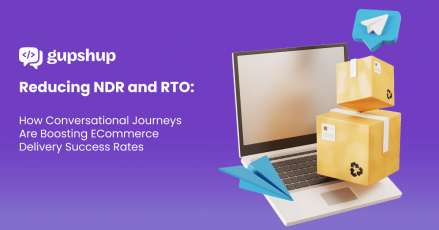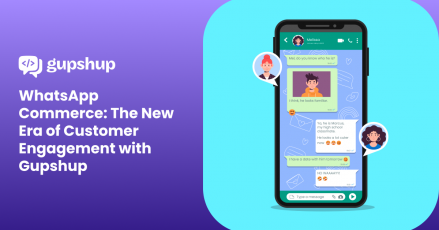How are Chatbots Powering the Digital Economy for Brands in Brazil?

Introduction
Think about this: your online store in Brazil is thriving, with orders streaming in and customers constantly reaching out for support. How do you manage to keep everyone happy and maintain top-notch service? This is where the digital economy steps in, a powerhouse for growth that’s unlocking a world of opportunities for businesses and individuals alike. In Brazil, AI chatbots are at the heart of this revolution, bringing major benefits to companies by enhancing conversational engagement. Did you know that 98% of Brazilian businesses are jumping on the AI bandwagon, especially in their marketing strategies?
If you’re a Brazilian company, it’s time to invest in AI chatbots powered by Conversation Cloud and leverage the WhatsApp API for the retail industry in Brazil. Here’s the deal—in the e-commerce world, conversational AI makes online shopping a breeze. From answering questions to giving spot-on product recommendations, these chatbots are your new best friend.
And it’s not just retail. AI is making waves in finance by handling customer inquiries and transactions and in healthcare by improving patient interactions. In advertising, AI-driven chatbots help brands connect with customers personally, delivering tailored content and boosting conversion rates.
The impact of AI on Brazil’s economy is huge. It makes operations smoother and conversational engagement better across the board.
Brazilian brands aren’t just getting more efficient with AI chatbots—they’re also driving growth and sparking innovation in the digital marketplace. It’s an exciting time for businesses and customers alike! Read on to find out how.

Chatbots in the Brazilian Market

Gradually, businesses in Brazil are integrating chatbots into their customer engagement strategies, recognizing their potential to revolutionize customer interactions. With almost 140 million Brazilians on WhatsApp, this popular platform has become a key channel for businesses to offer efficient and personalized customer support through chatbots.
In fact, thanks to its user-friendly interface and strong WhatsApp Business API capabilities, businesses can seamlessly integrate chatbots, offering round-the-clock support.
Not just conversational AI but Generative AI is also making a big splash in customer interactions across Latin America.
In Brazil, the market is expected to demonstrate an annual growth rate (CAGR 2024-2030) of 46.50%, resulting in a market volume of US$5.24 billion by 2030.
By leveraging advanced language models, Gen AI enables chatbots to have more natural (human-like) and meaningful conversations with customers. This tech boosts response accuracy and cuts down on misinformation, building trust and reliability. Businesses across the region are experiencing improved customer engagement and satisfaction as Gen AI-powered chatbots gain popularity.
The widespread use of AI-powered chatbots, especially via WhatsApp Business API, highlights their importance in the Brazilian market, driving growth and innovation across various industries.
How to Enhance the Online Shopping Experience for Brazilian Consumers with Chatbots

Here are some innovative ways in which AI chatbots can enhance customer conversational engagement in Brazil –
1. Innovative Product Discovery
AI has made product discovery a lot easier. Here are some ways you can integrate innovative product discovery into your marketing strategy.
Voice-Activated Shopping
Imagine customers effortlessly adding items to their cart, setting reminders and alarms, or booking the next flight—all with just their voice. Convenient, right?
Voice-activated shopping is shaking up how we find and buy products, thanks to advances in natural language processing (NLP) and AI. Virtual assistants, like the ones integrated with WhatsApp Business API are getting smarter; they can understand complex voice commands, handle different accents, and remember past interactions to make shopping easier and hands-free.
If we talk about Brazil, the adoption of voice-activated virtual assistants on smartphones increased from 87% to 91% over the last few years. In fact, 67% of survey respondents in Brazil reported using virtual assistants for tasks like checking the weather and other subjects.
So, it’s no wonder we’re all starting to shop with our voices for quicker and more efficient purchases.
Smart Recommendations
Ever noticed how the voice assistant seems to tell exactly what customers want? That’s how AI-driven smart recommendations work. These systems offer personalized product suggestions to your customers by analyzing their behavior, purchase history, and browsing patterns. They keep getting better and better at making accurate recommendations over time.
In addition to advancements in smart recommendation systems, businesses are leveraging the best WhatsApp Business API to enhance customer interaction and support.
Dynamic Inventory Updates
Picture this: Your customers are shopping for a product, but it’s out of stock. It can be annoying for them, right? Dynamic inventory updates powered by Conversational Cloud solve this problem for you by providing real-time stock information and alternative suggestions.

2. Personalized Shopping
Conversational AI has introduced personalized shopping, and there is no going back now. Let’s see how it has affected shopping experiences for Brazilian people –
Customized Product Curation
AI-driven recommendation systems gather loads of data about your customers’ browsing habits. These machine learning algorithms are like their personal shoppers, suggesting items based on what they have liked or bought before.
Think about it: customers could get recommendations for best sellers, trending products, or most viewed items. This targeted approach doesn’t just make shopping easier; it boosts sales and customer satisfaction. Everyone wins!
Omni-Channel Synchronization
By integrating chatbots into mobile apps and various websites, you can achieve real-time tracking of your customer’s preferences. This omni-channel synchronization ensures a smooth and personalized shopping journey, no matter where your customers are.
QR Code Convenience
QR codes are making shopping even more personalized and convenient. They’re not just for quick access to product information anymore. When combined with chatbot, QR codes can deliver personalized content based on customer’s past interactions and preferences.
Picture this: you scan a QR code on a product in-store and instantly get recommendations for complementary products, customer reviews, and detailed information about what you’re looking at.
3. Seamless Checkout Experiences
While product discovery and choosing products are easier, why forget about the smooth checkout experience? Let’s see how chatbots have changed that –
Cart Recovery Savvy
One of the most successful methods is sending cart abandonment reminders. You can use automated messages, often through chatbots, to remind customers of the items left in their cart. These chatbot messages are personalized and timely, nudging customers to complete their purchase by highlighting product benefits or offering exclusive incentives like discount codes or free shipping.
Chatbots can also facilitate direct assistance, allowing customers to ask questions or receive support instantly, which can further encourage them to finalize their purchase.

Effortless Payments
Simplified checkout processes are crucial for reducing cart abandonment. Offering a variety of payment options, such as digital wallets and buy-now-pay-later (BNPL) services, can cater to diverse customer preferences and make the checkout process smoother. This flexibility reduces friction and increases the likelihood of customers completing their purchases.
Incorporating secure conversational interfaces, such as AI-driven chatbots via WhatsApp business API, can also streamline the checkout process. These chatbots can guide customers through the checkout and handle payments securely, making the overall shopping experience more efficient and user-friendly.
4. Always-On Assistance
This is another important factor when considering integrating AI chatbots into your system –
Round-the-Clock Customer Care
Imagine needing help at 3 AM and getting instant support. AI-driven chatbots integrated with WhatsApp Business API make this possible by providing 24/7 customer service, drastically reducing wait times and boosting customer satisfaction. Businesses can now cater to a global audience without hiring extra staff. This ensures that help is always just a message away.
Tailored Interactions
Using customer data, these AI-driven bots greet your customers by their names, suggest products based on past purchases, and provide personalized assistance (with the help of platforms like Conversational Cloud). This interaction builds a stronger connection with customers, making them feel valued and boosting their loyalty.
Instant Gratification
We live in a fast-paced world where waiting is a no-go. AI-powered chatbots excel at providing immediate responses to inquiries, giving customers the instant gratification they crave. Whether it’s answering a question or solving a problem, bots integrated with WhatsApp Business API ensure your customers get what they need right away, enhancing the overall experience.
Swift Issue Resolution
Routine tasks and common questions? Chatbots have got it covered. This allows human agents to focus on more complex issues that need a personal touch.
For instance, bots powered by WhatsApp Business API can handle checking order statuses or scheduling appointments, and a human can step in for intricate problems. This division of labor means better support across the board.
Integration with Human Support
The real magic happens when chatbots and human agents team up. While bots handle the basics, they seamlessly pass on the tougher queries to human agents, ensuring a smooth transition. This hybrid approach means customers get the best of both worlds.
5. Proactive Feedback Gathering
Ever wondered what your customers really feel? Once the transaction is complete, the work for a business is still not over. One important thing is left – the feedback. Here is how AI can help:
Automated Experience Surveys
Automated experience surveys capture valuable feedback promptly. There are tools that enable businesses to create tailored surveys, gauging customer satisfaction and purchase ease. Integrating these surveys into WhatsApp Business API ensures timely feedback collection, optimizing insights for continuous improvement.
Emotion-Driven Insights
AI-driven sentiment analysis tools dive into feedback from social media, reviews, and surveys to figure out if your customers are happy, mad, or just meh. This emotional intel is gold.
For instance, there are tools that can track what people are saying about you in real-time, so you can jump in and fix issues on the spot. It’s all about knowing exactly what’s working and what’s not, from your customers’ perspective.
Instant Feedback Loops
Now, let’s talk instant feedback loops. This is about collecting and acting on customer feedback continuously. Automated systems help gather and sort through feedback, integrating with customer service platforms like WhatsApp Business API. This means you can address concerns right away, keeping customers happy and loyal.
6. Optimized Inventory and Order Management
While a customer’s buying journey is important, there are other things that AI driven chatbots can help with. Let’s see how –
Predictive Inventory Control
Imagine being able to predict exactly what your customers will want before they even know it themselves. That’s what predictive inventory control does using AI and machine learning.
By analyzing tons of data—like past sales, market trends, and even the weather—AI can forecast demand with impressive accuracy, and Gupshup’s Conversational Cloud is a great tool for this.
For example, one of the top global retailer chains uses AI to sift through historical data and anticipate what customers will need, ensuring their shelves are always stocked just right.
Real-Time Updates
Ever been frustrated by finding something out of stock online or in-store? Real-time inventory updates can solve that. With AI, businesses can keep track of stock levels across multiple locations at once—warehouses, retail stores, you name it.
This kind of visibility means fewer stockouts and overstock situations, which boosts conversational engagement.
Order Transparency
Nobody likes waiting around wondering where their order is. AI-driven order management systems offer real-time tracking of orders, ensuring transparency throughout the supply chain. By integrating AI with order management, businesses can track orders from placement to delivery, spotting and solving issues quickly, which makes for happier customers.
The Gupshup Value Proposition for Retail Brands in Brazil
Ever tried keeping up with customers across multiple platforms in Brazil? It’s a real challenge. But that’s where Gupshup shines. This platform seamlessly integrates with over 30 messaging channels—including WhatsApp, Facebook Messenger, SMS, and more—channels that are crucial for reaching Brazil’s digitally connected population.
Gupshup doesn’t just integrate; it personalizes. Brazilian businesses can create chatbots that truly embody their brand’s identity. Using advanced AI and tailored language models, Gupshup’s Auto Bot Builder crafts chatbots that speak directly to Brazil’s diverse industries. These chatbots don’t just respond—they engage, providing personalized and contextually relevant experiences that elevate customer engagement.
With Gupshup, Brazilian brands are mastering modern customer engagement effortlessly. They’re delivering seamless interactions, creating personalized journeys, and deploying scalable solutions that drive growth and foster long-lasting customer loyalty. It’s like having a trusted ally in the digital economy, empowering brands to thrive in Brazil’s competitive marketplace.
Frequently Asked Questions (FAQs)
What is the Brazilian strategy for artificial intelligence?
Brazil’s AI strategy aims to boost technological development, ensure ethical use, and promote economic growth. Key goals include advancing research, enhancing public services, and increasing global competitiveness. The strategy also emphasizes non-discrimination, privacy protection, and transparent AI usage to mitigate biases and ensure human rights are respected.
What is the best chatbot in the world?
The best chatbot in the world is widely considered to be OpenAI’s ChatGPT, particularly the GPT-4 model. It is renowned for its advanced natural language processing, versatility, and ability to generate human-like responses across diverse applications.
What is Brazil’s policy on AI?
Brazil’s policy on AI focuses on ethical AI development, transparency, and risk management. The proposed AI legal framework emphasizes human rights, privacy protection, and non-discrimination, with specific provisions for high-risk AI applications and detailed public impact assessments.




